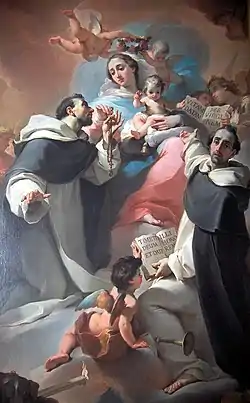Ubaldo Gandolfi
Ubaldo Gandolfi (1728–1781) was an Italian painter of the late-Baroque period, mainly active in and near Bologna.

Biography
He was born in San Matteo della Decima and enrolled by the age of 17 at the Clementine Academy, where he apprenticed with Ercole Graziani the Younger, Felice Torelli, and Ercole Lelli. He was from a large family of prolific artists, including his sons Giovanni Battista and Ubaldo Lorenzo, as well as his brother Gaetano and nephews Mauro, Democrito (who became a pupil of Antonio Canova), and niece Clementina. Together, they are considered among the last representatives of the grand manner of painting characteristic of the Bolognese school, that had risen to prominence nearly two centuries earlier with the Carracci.
Gandolfi's work ranges from Baroque to Neoclassic styles, and specifically recalls the style of Ludovico Carracci. He completed, in 1770–75, a series of canvases on mythological narratives for the Palazzo Marescalchi in Bologna (two are now in Museum of North Carolina ). A series of seven saints painted by Gandolfi is on display at the Quadreria of the Palazzo Rossi Poggi Marsili in Bologna. He died in Ravenna in 1781. Among his pupils was Giuseppe Grimanti,[1] Giovanni Lipparini (il Rosolino),[2] and Nicola Levoli.
References
- Guida del forestiere per la città di Bologna e suoi sobborghi, by Girolamo Bianconi; Annesio Nobili, Bologna, 1820, page 504.
- Annali della città di Bologna dalle sua origine, 1796, Volume 8, page 740.
- Cazort, Mimi, Bella Pittura: The Art of the Gandolfi, Ottawa, National Gallery of Canada, 1993.,
- Cazort, Mimi, The Art of Embellishment: Drawings and Paintings by Gaetano and Mauro Gandolfi for a Festive Carriage, in Record of The Art Museum, Princeton University, Volume 52, Number 2, 1993.
- Rosasco, Betsy, Drawings by the Gandolfi Family and Their Followers in The Art Museum: A Checklist, in Record of The Art Museum, Princeton University, Volume 52, Number 2, 1993.
- Vicenza, Neri Pozza, I Gandolfi: Ubaldo, Gaetano, Mauro, disegni e dipinti, Neri Pozza Editore, 1987.




